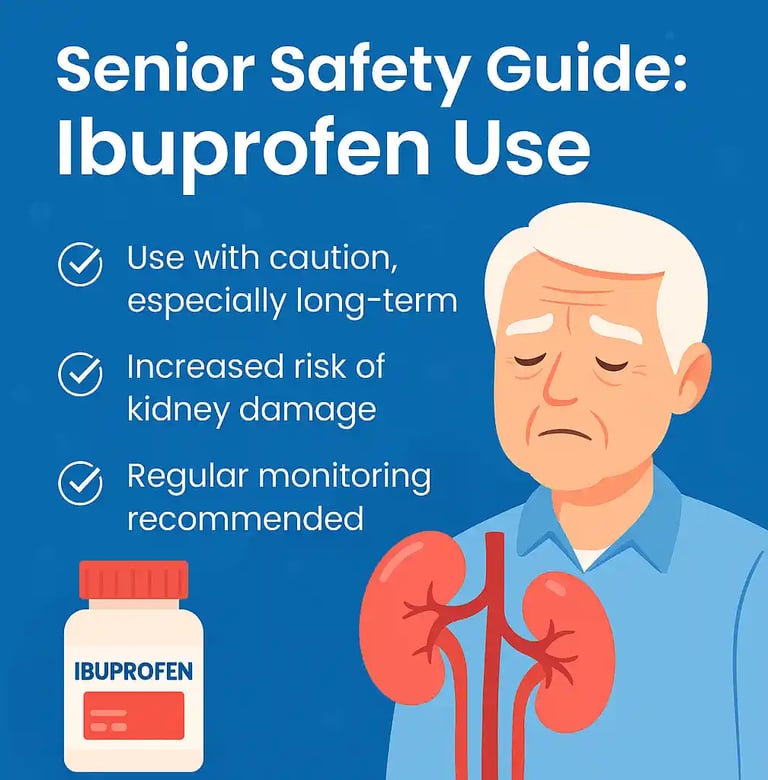Ibuprofen and Kidney Health in Seniors: Risks, Safety, and What to Know
Learn how ibuprofen affects kidney health in seniors. Understand risks, side effects, and safe pain relief for older adults with health conditions.


Ibuprofen and Kidney Health in Seniors: Risks, Safety, and What to Know
How Ibuprofen Impacts Older Adults
As we age, our kidneys naturally lose some of their ability to filter waste from the bloodstream. This makes seniors more vulnerable to medications that can strain or damage kidney function — and unfortunately, ibuprofen is one of them. Ibuprofen belongs to a class of drugs called NSAIDs (nonsteroidal anti-inflammatory drugs), which reduce inflammation and pain by blocking enzymes called COX-1 and COX-2. For more on how Ibuprofen works, click here.
Unfortunately, this also reduces blood flow to the kidneys and has the potential of interfering with the hormones that help regulate kidney function. In seniors — especially those with high blood pressure, diabetes, or existing kidney concerns — this effect can be significant.
Increased Risk of Kidney Injury in Seniors
Even short-term use of ibuprofen can trigger acute kidney injury in older adults who are dehydrated, on diuretics, or taking certain blood pressure medications. This risk increases with longer use, higher doses, or using ibuprofen without adequate fluid intake.
Kidney injury from ibuprofen may not cause noticeable symptoms right away, but signs can include swelling in the legs or ankles, reduced urination, fatigue, and confusion. Regular blood tests are the only way to catch early kidney problems — especially for seniors who take ibuprofen more than occasionally.
FAQ
Can seniors safely take ibuprofen at all?
Many older adults can take ibuprofen occasionally with proper hydration and at the lowest effective dose. But it’s important to consult a healthcare provider if you’re over 65 and want to take ibuprofen regularly.
How can I reduce the risk of kidney damage from ibuprofen?
Stay well-hydrated, avoid high doses, and never take it for long periods of time without medical guidance. If you're also taking blood pressure medications or diuretics, ask your doctor before taking ibuprofen.
Are there safer alternatives for seniors?
Acetaminophen (Tylenol) may be a safer pain relief option for many seniors, especially for managing chronic pain and without affecting kidney function. But this should also be discussed with a doctor. See also Ibuprofen v. Tylenol.
What’s the biggest warning sign of kidney issues from ibuprofen?
Reduced urination, swelling, or a sudden increase in fatigue could all point to kidney strain. Don’t wait for symptoms — ask your doctor for periodic kidney function tests if you're regularly taking Ibuprofen or NSAIDs.
Disclaimer
This page summarizes information from trusted medical sources and is provided for general knowledge only. lt is not medical advice; Always consult your doctor or pharmacist for personal medical guidance (For a more comprehensive explanation please see the full disclaimer).
Resources
The information above has been gathered from several reputable sources, including the following:
[1] Mayo Clinic – Ibuprofen (Oral Route)


